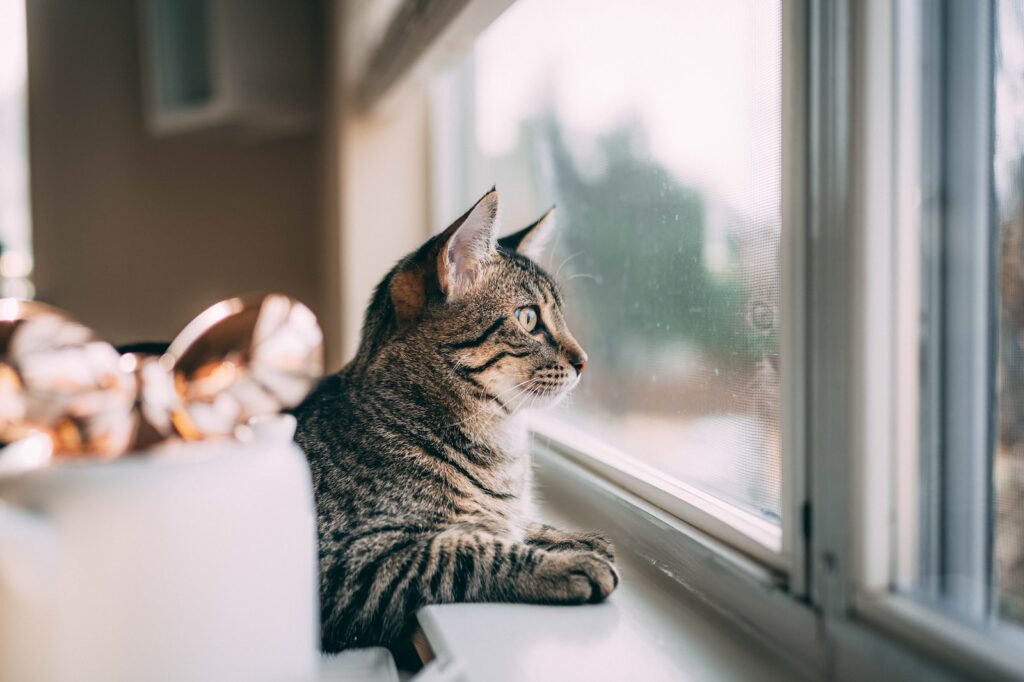
Cats are often seen as independent and aloof creatures, but they still need human companionship and care. Leaving your cat alone for too long can have negative effects on their physical and mental health, as well as their behavior. In this article, we will explore the consequences of leaving your cat lonely, and how to prevent them. We will also discuss the reasons why some cat owners may have to leave their cats alone, and the best ways to prepare for those situations.
Leaving your cat during the morning
Many cat owners have to leave their cats alone for a few hours every morning, when they go to work or school. This is usually not a problem, as long as you provide your cat with enough food, water, toys, and a comfortable place to sleep. However, some cats may suffer from separation anxiety, and become stressed or depressed when you leave. They may show signs of distress, such as meowing, scratching, or urinating outside the litter box. They may also develop health issues, such as loss of appetite, vomiting, or diarrhea. To help your cat cope, you can try the following tips:
- Establish a routine: Cats like predictability, so try to leave and return at the same time every day. Before you go, feed your cat, play with them, and give them some affection. When you come back, greet your cat warmly, and spend some quality time with them. This will help your cat feel more secure and confident, and reduce their anxiety.
- Enrich their environment: Cats need stimulation and entertainment, especially when they are alone. Provide your cat with a variety of toys, scratching posts, hiding places, and window views. You can also leave some background noise on, such as music or TV, to keep your cat company. You can also rotate the toys every few days, to keep your cat interested and curious.
- Consider getting another cat: Some cats may benefit from having a feline friend to keep them company. However, this depends on your cat's personality and preferences. Some cats may prefer to be the only cat in the house, and may not get along with a new cat. If you decide to get another cat, make sure to introduce them gradually and carefully. You can also consult your vet or a behaviorist for advice on how to choose and socialize a new cat.
Leaving your cat for several days at home alone
Sometimes, you may have to leave your cat alone for more than a day, for example, when you go on a trip or have an emergency. This can be very stressful for both you and your cat, and it is not recommended unless absolutely necessary. Cats need daily human interaction and supervision, and they can get into trouble or danger if left alone for too long. They may feel lonely, bored, or scared, and develop behavioral problems such as aggression, spraying, scratching, or hiding. They may also face health risks such as dehydration, starvation, infection, or injury. If you have to leave your cat for several days at home alone, you should do the following:
- Find a reliable pet sitter: The best option is to have someone you trust visit your cat at least once a day, to feed them, clean their litter box, play with them, and check on their well-being. You can also ask them to send you updates and photos of your cat. Alternatively, you can board your cat at a reputable cattery or vet clinic, where they will receive professional care and attention.
- Prepare your home: Before you leave, make sure your home is safe and comfortable for your cat. Secure all windows and doors, remove any potential hazards or toxins, and set the thermostat to a comfortable temperature. Leave enough food and water for your cat, preferably in automatic dispensers that will prevent overeating or spillage. You can also leave some of your clothes or blankets with your scent on them, to comfort your cat.
- Leave a note: In case of an emergency or an unexpected visit from someone else, leave a note with your contact information and your cat's name, medical history, dietary needs, and vet details. This way, anyone who comes to your home will know how to take care of your cat or contact you if needed.
You are home but not caring and communicating with your cat.
Even if you are home most of the time, you may still neglect or ignore your cat if you are busy or distracted by other things. This can make your cat feel lonely and unloved, and lead to behavioral problems such as aggression, spraying, scratching, or hiding. They may also lose interest in playing or grooming, and become lethargic or depressed. To avoid this situation, you should make sure to give your cat enough attention and affection every day. Here are some ways to do that:
- Talk to your cat: Cats may not understand everything you say, but they can recognize your voice and tone. Talking to your cat can help them feel more connected and secure with you. You can talk to your cat about anything you want, such as what you are doing, how you feel, or what you plan to do later. You can also use their name often, praise them when they do something good, or comfort them when they are scared or upset.
- Play with your cat: Playing with your cat is not only fun, but also beneficial for their physical and mental health. It helps them exercise, release stress, stimulate their instincts, and bond with you. You should play with your cat for at least 15 minutes a day, using toys that mimic their natural prey, such as feathers, mice, or balls. You can also try interactive games, such as hide and seek, fetch, or laser pointer.
- Pet your cat: Petting your cat is a great way to show them affection and make them happy. Cats love to be petted on their head, chin, cheeks, and back. However, some cats may not like to be petted on their belly, tail, or paws, and may bite or scratch you if you touch them there. You should respect your cat's boundaries and preferences, and stop petting them when they show signs of discomfort or irritation, such as twitching their ears, flicking their tail, or flattening their fur.
Remember, your cat is not just a pet, but a family member and a friend. They deserve your love and care, and they will reward you with their loyalty and affection. Don't leave your cat lonely, and they will never leave you alone.
